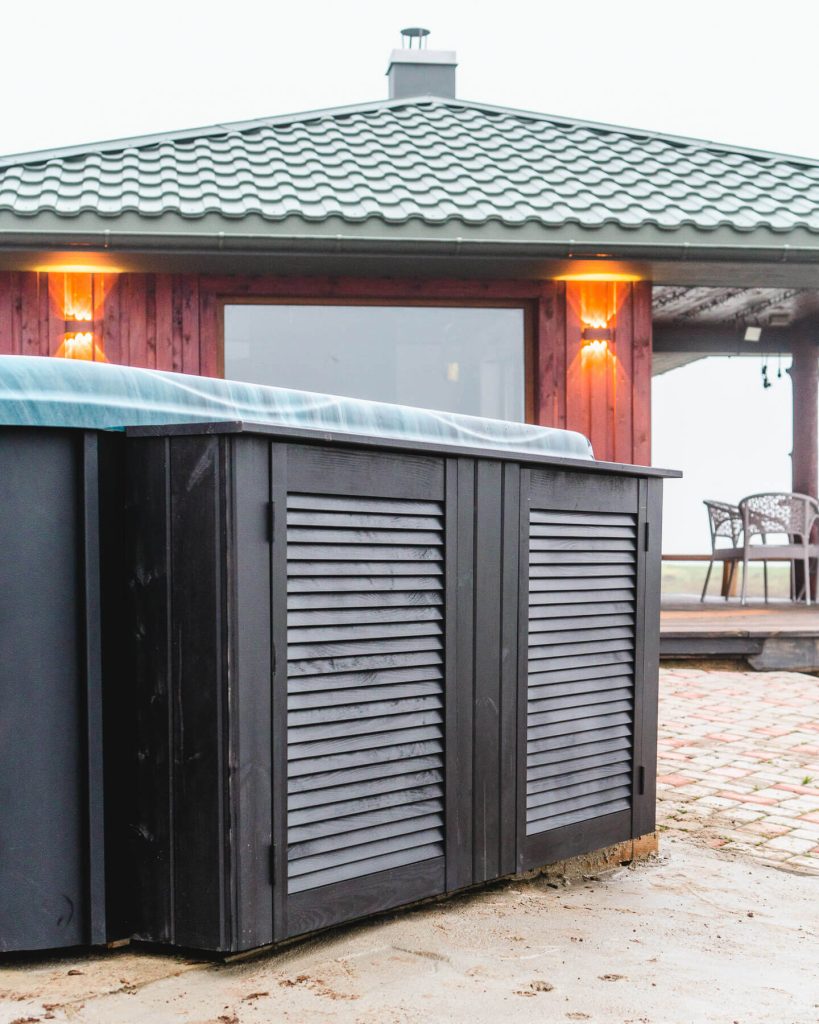With three distinct types of heating systems available on the hot tub market today, finding the right one to suit your situation can be quite difficult. Especially if you don’t understand the nuances of each. Come dive in with us as we dissect and compare the three different heating systems, allowing you to choose the ideal one for your needs and optimize your soak time.
Gas heated Hot Tub – Pros and Cons
Gas-powered heaters use natural gas or propane gas to run. You can find gas heaters in free-standing wooden spas, portable spas, or in-ground spas. Any gas heaters that come with portable hot tubs are installed externally on the outside of the spa cabinet. A gas contractor will come and connect the gas line to the hot tub heater, which will supply it with fuel. To start the heater up, you will need to ignite it.

Pros of Gas heated Hot Tub
Lower Operating Costs
In recent years, natural gas has become far less expensive than it used to be. While propane costs a bit more, it doesn’t produce as many BTUs, which is better for the environment.
Quick Heating
When it comes to heating speed, a gas heater takes the cake over an electric heater. Gas spa heaters can easily increase the temperature by 1-2 degrees Fahrenheit per minute. Electric heaters, on the other hand, can take an hour or more to add a couple of degrees to the water temperature. With gas heat, you can keep your hot tub a cool or warm temperature, only heating it up when you need it.
Better for Colder Climates
If you live in a climate that is freezing year-round, using a gas spa heater is a great choice. Electric heating systems can generate much higher electricity costs during the winter compared to gas heating systems. Plus, when it comes to wooden hot tubs, spas that are poorly insulated, or spas that have more than 700 gallons of water, gas heater systems are a much better choice for energy-efficiency.
Cons of Gas heated Hot Tub Heaters
Higher Initial Cost
You will spend more money right off the bat on a gas heater. In many cases, they can cost up to $1,000. Plus, you will need to connect your gas line a tank with gas or propane. To bury a gas line, you might have to spend a considerable amount of money depending on how far you are running the line.If you need to run it very far, it could exceed the initial cost of the gas heater.
You’re Dealing With Gas
While getting into an accident with a gas heater is a very unlikely scenario, it can happen. When it comes to any kind of appliance that deals with gas, you need to consider the risks associated with gas before deciding on the heating element that you want to use. Some of the risks associated with propane heaters or gas heaters include carbon monoxide exhaust and leaks.
Installation
Gas heaters aren’t small by any means. You won’t be able to simply hide them under your hot tub or spa. Because they use gas, you need to make sure that they sit on the outside of your spa with fresh air access and room for the exhaust to move out.
Electric Spa Heaters Pros and Cons

People will often refer to electric spa heaters as flow-thru hot tub heaters. These long, electric heating elements sit inside a tube made of stainless steel. You will have complete access to your electric heating system thanks to the fact that there are union connectors on the outside of the tube.
You will also find sensors that monitor water flow and temperature, which come in the form of high limit switches, pressure switches, and temperature sensors.
Pros of Electric Spa Heaters
Low Costs
If you live in a fairly temperate climate and have a hot tub that is well-insulated and comes with a high-quality spa cover that can protect from heat loss, then an electric heater might be your best bet. In these situations, they are far more cost-efficient than gas spa heaters. In the case that you live in an area where utility costs are very high, on the other hand, the cost of electricity might exceed a justifiable price.
Low Purchase Cost
Compared to gas heaters, electric spa heaters cost a lot less. Typically, you will end up spending anywhere from $100-$300 for an electric hot tub heater. Plus, you won’t have to run a gas line, which means the installation process is much easier as well. Most electric hot tub heaters run on a GFCI circuit breaker and are powered by 240 volts and 60 Amps. Of course, you will need an electrician to come to your home and install the GFCI, which can cost a fair bit of money depending on the difficulty of the job.
Low Maintenance and Repair Costs
Electric spa heaters are pretty simple compared to gas heating systems. If you need to repair your hot tub heating system, you probably won’t spend any more than $100 to do so. Gas hot tub heaters, on the other hand, can be incredibly complicated and can take a lot of work to repair, which can be costly.
Cons of Electric Spa Heaters
Heat Water Slow
With a smaller spa that is well-insulated and runs on a traditional 5 kW heater or 11 kW heater, you can probably expect a rise of 2-3 degrees for your water every hour. If it is very cold outside or there is tons of wind/rain/snow, that heat gain might drop down to as little as 1-degree per hour. Compare that to a hot tub with a propane tank or wood unit and you get really slow heating times.
Electricity Can Be Dangerous
Of course, water and electricity are not best friends. It is important that you first consider the accidents that can happen if you’re not careful. Of course, there is a reason newer hot tubs and swim spas come with GFCI protected circuits, as they can help deter any potential hazards.
Costs More To Operate
If your electricity is greater than 25 cents per kW, then it may cost you more to operate a hot tub that uses electric heat. Customers often complain about hot tubs that aren’t efficient in colder climates. While poor insulation can have a lot to do with why your water isn’t warm, a lot of the time it simply has to do with the fact that you’re running an electric heater.
Final Thoughts – How Should You Heat Your Hot Tub?
When all is said and done, we believe that hot tubs run better with electric heating systems compared to gas. They are much simpler to use and much more inexpensive in the short and long run. To run gas heat, you will need a constant supply of gas, meaning more trips to the store. Plus, with gas heat, you’ll need more external accessories to house everything.
If you live in very cold climates or places where energy prices are very high, you may consider going with gas heat instead. It truly depends on the circumstances. If you aren’t using your hot tub very often, having gas heat is great too, as you can heat your hot tub up quickly without using much energy.
Whether you’re ready to buy a hot tub, or would just like to see the lowest prices in your area, click on the button below! We’ll provide several free quotes from dealers nearby based on your ideal hot tub setup!
